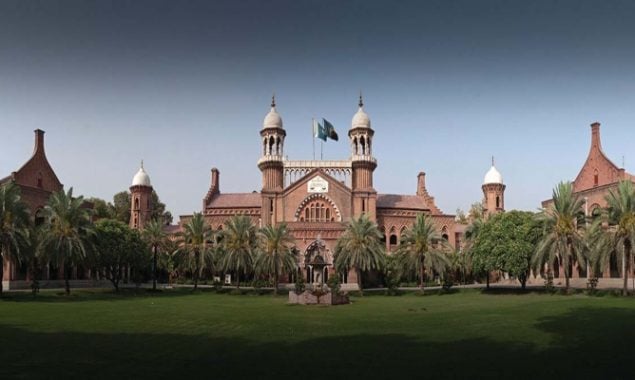
A view of the building of Lahore High Court. Image: File
LAHORE: The Lahore High Court (LHC) on Monday ruled that right to identity is a fundamental, non- derogable, independent and autonomous right and a citizen could not be denied issuance of computerised national identity card (CNIC) merely on the ground that he/she is clueless about his/her biological parentage.
In its nine-page judgment, Justice Muhammad Shan Gul observed that the right to identity is rooted in human dignity and preserves each human’s distinct existential interest while its denial is a blatant violation of the constitution.
Zarmeen Abid, an 18-year-old girl, had approached the LHC against the blocking of her CNIC by the National Database and Registration Authority (NADRA). Her foster mother, Zarsanga Nasir, adopted her during the subsistence of her marriage with Abid-ur-Rehman.
Read more: LHC dismisses petition seeking ban on PUBG in Pakistan
The foster mother, after ending her first marriage with Abid-ur-Rehman, remarried Nasir Ahmad and whose name was entered in the NADRA record as the father of the petitioner in an adopted capacity.
However, the childhood testimonials of the petitioner, as also her educational qualification degrees and cards, carried the name of Abid-ur-Rehman as her father, as does her B-Form.
Nobody knows anything about her real biological parents, not even her foster mother Zarsanga Nasir.
Later, Nasir Ahmad, applied to the NADRA to block the petitioner’s identity card since he claimed she was not his daughter.
Read more: State, not individuals can request for funds for Jihad: LHC
The authority blocked and cancelled CNIC without affording her opportunity of personal hearing in absolute derogation of Section 18 of the National Database and Registration Authority Ordinance, 2000.
She requested the NADRA to issue a fresh identity card but was refused and resultantly approached LHC.
The court maintained that now it is not possible to get higher education, apply for a job, open a bank account, get a driving licence, utility connections, purchase railway and air tickets, execute any instrument, stay in a hotel or lodge, appear in court proceedings and enter in certain buildings and premises without production of CNIC.
It means that ‘blocking of CNIC’ is actually negating the very identity of a person, which amounts to depriving him nearly of all the necessities, leaving him helpless and even imposing restrictions to his freedom of movement, the judgment read.
“This Court considers that it is the serious violation of fundamental rights of a person if her identity is blocked on the ground of suspicion without giving her an opportunity of hearing under section 18 of NADRA Ordinance 2000”
The court observed that her right to dignity of life, right to travel, right to free movement, right to education, and right to own property, were at stake and directed NADRA Director-General (DG) to consider her case sympathetically and promptly, asking him to take guidance from the policy made on LHC’s direction in 2017 for issuance of CNICs to eunuchs, orphans with unknown parentage. It was further held that in the case of eunuchs with unknown parentage, identity cards would be granted by filling in their parentage columns with random names culled from the NADRA database.”
The court observed that NADRA DG acceded to the petitioner’s request to issue her a fresh identity card with the same (imaginary) yet necessary parentage of Abid-ur-Rehman and “now the petitioner stands entitled and eligible to enjoy the rights guaranteed to her by the Constitution.”
It may be mentioned that the name Abid-ur-Rehman is not of the same Abid-ur-Rehman who was previously married to the petitioner’s mother but is rather in the nature of the imaginary.
The court said the obligation to respect identity means that the state must refrain from actively interfering with the individual’s identity. This responsibility encompasses protection from arbitrary denial of identity documents, as that directly violates the individual’s right to identity, and interferes with her name and ties to family, place, and nation.
The obligation to protect identity means that the state must take necessary measures to prevent others from interfering with the individual’s identity.
On a global level, this responsibility requires states to register their populations, since civil registration, in turn, protects citizens and other individuals within a state’s territory from vulnerability to criminal activity like human trafficking, forced prostitution, bonded labour, etc.
Therefore, guaranteeing a national identity document to those aged 18 and above is integral to ensuring protection from criminal activity and general menaces which tend to benefit from the lack of identity documentation of individuals, especially vulnerable population groups like women, persons with disabilities, indigenous people, transgender persons etc.
Catch all the Pakistan News, Breaking News Event and Latest News Updates on The BOL News
Download The BOL News App to get the Daily News Update & Follow us on Google News.




